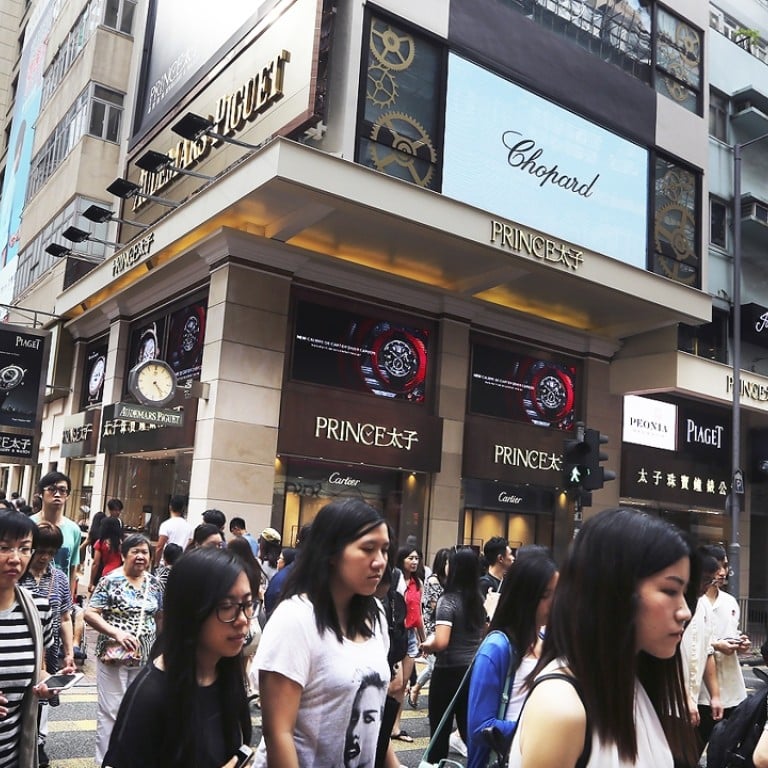
IMF forecasts Hong Kong market troubles in the wake of US interest rate hike
Retail and hotel sectors to be hard hit; luxury car market also down
Local exporters and retailers are bracing for a further drop in consumer demand ahead of an imminent interest rate hike in the United States this week - the first increase in almost a decade.
The gloomy outlook comes as the International Monetary Fund forecast tough market conditions for Hong Kong in the coming months.
“The period ahead could be challenging as interest rates rise ... and as the mainland economy slows to a safer and more sustainable growth rate,” said the fund’s Hong Kong mission chief Malhar Nabar.
READ MORE: Hong Kong financial secretary says likely US interest rate rise is city’s top economic concern
Stanley Lau Chin-ho, honorary president of the Federation of Hong Kong Industries, said the prospect of a rate increase in America loomed large.
“Clients were not willing to place big orders for Thanksgiving and Christmas despite strong economic data on the US economy,” said Lau, managing director of Renley Watch Manufacturing.
Lau said while exporters in Hong Kong had been expanding to other markets such as Asian countries for many years, their dependence on traditional markets had left them vulnerable.
“But we are still not too optimistic about business next year, given that the US and Europe remain our primary markets,” the veteran industrialist said.
Lau, whose company employs about 200 people in Hong Kong, said he had no plans to scale back his operations at the moment.
“We will continue to monitor the market for at least three more months before making any decisions about adjustment,” he said.
READ MORE: Higher US interest rates could be dangerous in a ‘wobbly bike’ world economy, says Schroders
Paul Law Siu-hung, chairman of Olympic Motor Group and a used car dealer, said sales at his company in recent months had dropped about 10 per cent, compared with last year.
“Luxury cars have been hit hardest,” said Law, citing a weakening economic outlook further exacerbated by a possible US rate rise as an obvious drag on consumer sentiment.
Law said some car dealers were planning to cut costs by reducing jobs and moving into smaller offices, while shelving promotional campaigns to save advertising dollars in a sluggish market.
The Hong Kong General Chamber of Commerce played down the impact of higher US interest rates on the city, saying the property market would not be adversely affected if it was just one increase.
“An increase of a quarter of a percentage point will have little impact on the ability of people to pay off their mortgage,” said Rocky Tung Yat-ngok, the chamber’s senior economist. “It can also remove uncertainty from the global economy.”
READ MORE: ‘No exit strategy’ in Hong Kong as rise in US interest rates looms
But Tung warned that more raises would eventually hurt Hong Kong’s economy, adding that the city’s retail and hotel sectors had been under pressure to scale back their operations amid dwindling visitor arrivals and slack demand.
The IMF echoed Tung’s views, adding that risks would arise from a faster-than-anticipated increase in interest rates because a surge in financing costs could restrain consumer and corporate spending and dampen overall economic activity in Hong Kong.
“In order to secure healthy growth and job creation in Hong Kong in the years ahead, a mix of policies is needed,” said IMF’s Hong Kong mission chief Nabar, “ including proactive use of the fiscal space to cushion the economy against near-term shocks ... and maintaining the linked exchange rate system”.
Nabar said the Hong Kong dollar’s peg to the greenback had been an anchor of stability for over three decades and remained the best arrangement for Hong Kong, “especially at a time when the global outlook is turning more tentative”.
His remarks came after the IMF noted that Hong Kong’s economy had grown steadily in recent years and real gross domestic product was now about 25 per cent higher than during the trough of the global financial crisis in the first quarter of 2009.
The IMF expected Hong Kong’s economy to grow about 2.25 per cent this year. Growth was expected to pick up to 2.5 per cent next year, with a lower drag from foreign demand projected to reinforce resilient domestic demand.

